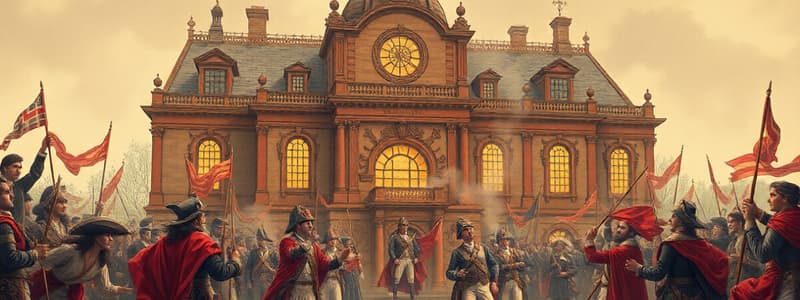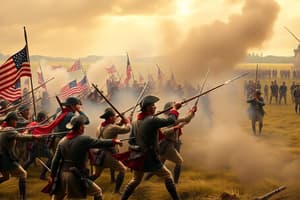Podcast
Questions and Answers
What was one significant impact of the American Revolution on state constitutions?
What was one significant impact of the American Revolution on state constitutions?
- It limited voting rights to only white males.
- It mandated universal suffrage.
- It eliminated all forms of voting.
- It expanded voting rights to more people. (correct)
The invention of the cotton gin resulted in the decline of slavery in the South.
The invention of the cotton gin resulted in the decline of slavery in the South.
False (B)
What contrasting vision of liberty was advocated by some early Americans?
What contrasting vision of liberty was advocated by some early Americans?
Liberty rooted in equality of property.
The American Revolution marked the beginning of a new nation with both promise and __________.
The American Revolution marked the beginning of a new nation with both promise and __________.
Match the following outcomes with their descriptions:
Match the following outcomes with their descriptions:
What aspect of the economic landscape was affected by the revolution?
What aspect of the economic landscape was affected by the revolution?
Only a few individuals recognized the connection between claims of freedom and the oppression of enslaved people during the revolution.
Only a few individuals recognized the connection between claims of freedom and the oppression of enslaved people during the revolution.
Which battle is considered a turning point that led to French involvement in the American Revolution?
Which battle is considered a turning point that led to French involvement in the American Revolution?
The American Revolution resulted in immediate and significant changes to the roles of women in society.
The American Revolution resulted in immediate and significant changes to the roles of women in society.
What proclamation did Lord Dunmore issue concerning slaves during the American Revolution?
What proclamation did Lord Dunmore issue concerning slaves during the American Revolution?
The idea of _______ Motherhood emphasized the education of women to instill principles of liberty in children.
The idea of _______ Motherhood emphasized the education of women to instill principles of liberty in children.
Match the following outcomes with their descriptions during the American Revolution:
Match the following outcomes with their descriptions during the American Revolution:
What was a major reason for the low morale among Continental soldiers during the war?
What was a major reason for the low morale among Continental soldiers during the war?
The Declaration of Independence claimed that 'all men are created equal' without any contradictions.
The Declaration of Independence claimed that 'all men are created equal' without any contradictions.
During the American Revolution, an estimated _______ slaves fled to the British.
During the American Revolution, an estimated _______ slaves fled to the British.
Flashcards are hidden until you start studying
Study Notes
The American Revolution
- The American Revolution was a period of significant change and upheaval, resulting in the birth of the United States of America.
- The war for Independence saw the colonists fight against British rule, ultimately achieving victory and establishing their own nation.
- The British strategy was to capture major cities, forcing the colonists to surrender.
- While the British captured important cities like Boston, New York, and Charleston, the colonists held onto the countryside.
- The Battle of Trenton was a significant victory for the Americans, led by General George Washington.
- The Battle of Saratoga was a crucial turning point, leading to French involvement in the war against the British.
- The French alliance proved pivotal in the American victory at Yorktown in 1781, marking the end of the war.
Revolution's Impact
- The American Revolution had a profound impact on the lives of various groups within colonial society.
- Continental soldiers faced hardship and low morale due to poor rations and unpaid wages.
- Many colonists chose to fight for the British, while others remained pacifists.
- The revolution presented an opportunity for slaves to escape and seek freedom.
- Lord Dunmore, a British governor, issued a proclamation granting freedom to slaves who fought for the British, leading to an estimated 5,000 slaves joining the British cause.
- An estimated 100,000 slaves fled to the British during the war, with over 15,000 leaving the U.S. with the retreating British forces.
- Native American tribes were significantly affected, often caught between the warring sides. Many sought to remain neutral.
- The Iroquois Nation was divided, with some tribes siding with the British and others joining the Patriot cause.
- Despite the Continental Congress’ plea for neutrality, American troops exhibited brutality towards Native Americans who sided with the British.
The Revolution's Legacy
- The idea of Republican Motherhood emerged, emphasizing the importance of educating women to instill principles of liberty and government in their children.
- The revolution did not immediately abolish slavery or significantly alter the roles of women in society.
- The Declaration of Independence's assertion of "all men are created equal" held strong principles of liberty and equality, yet its implementation was fraught with contradictions, particularly concerning slavery.
- The revolution led to the establishment of state constitutions, expanding voting rights to more people, although primarily limited to white males.
- The revolution also marked the decline of apprenticeship and indentured servitude, paving the way for a different economic landscape.
- The invention of the cotton gin in 1793 by Eli Whitney reinvigorated slavery in the South.
- Some early Americans advocated for a vision of liberty rooted in equality of property, contrasting with the concept of liberty that is widely understood today.
- The American revolution did bring about significant changes in the religious landscape, leading to the separation of Church and State.
- Despite proclamations of liberty, the institution of slavery persisted, with few making connections between the claims of freedom and the oppression of enslaved people.
- The revolution represented a complex and multifaceted era, marking the beginning of a new nation with both promise and contradictions.
The American Revolution
- The American Revolution was a war for independence from British rule.
- British strategy involved capturing major cities like Boston, New York, and Charleston, attempting to force the colonists to surrender.
- While the British captured major cities, the colonists held onto the countryside.
- The Battle of Trenton, a victory for the Americans led by General George Washington, proved a significant turning point.
- The Battle of Saratoga was another crucial victory, prompting French involvement in the war against the British.
- The French alliance played a vital role in the American victory at Yorktown in 1781, ending the war.
Revolution's Impact
- The Revolution had a profound impact on various groups within colonial society.
- Continental soldiers faced hardships and low morale due to poor rations and unpaid wages.
- Some colonists supported the British, while others remained neutral or pacifist.
- The Revolution offered slaves an opportunity to escape and seek freedom.
- Lord Dunmore, a British governor, issued a proclamation granting freedom to slaves who fought for the British, prompting an estimated 5,000 slaves to join the British cause.
- An estimated 100,000 slaves fled to the British during the war, with over 15,000 leaving the U.S. with the retreating British forces.
- Native American tribes faced challenges as they were caught between the warring sides.
- The Iroquois Nation was divided, with some tribes siding with the British and others joining the Patriot cause.
- Despite the Continental Congress' plea for neutrality, American troops exhibited brutality towards Native Americans who sided with the British.
The Revolution's Legacy
- The idea of "Republican Motherhood" emerged, emphasizing the importance of educating women to instill principles of liberty and government in their children.
- The Revolution did not immediately abolish slavery or significantly alter the roles of women in society.
- The Declaration of Independence's assertion of "all men are created equal" held principles of liberty and equality, but its implementation contained contradictions, particularly concerning slavery.
- The Revolution led to the establishment of state constitutions, expanding voting rights to more people, although primarily limited to white males.
- The Revolution marked the decline of apprenticeship and indentured servitude, paving the way for a different economic landscape.
- The invention of the cotton gin in 1793 by Eli Whitney reinvigorated slavery in the South.
- Some early Americans advocated for a vision of liberty rooted in equality of property, contrasting with the concept of liberty that is widely understood today.
- The American Revolution did bring about significant changes in the religious landscape, leading to the separation of Church and State.
- Despite proclamations of liberty, the institution of slavery persisted, with few making connections between the claims of freedom and the oppression of enslaved people.
- The Revolution represented a complex and multifaceted era, marking the beginning of a new nation with both promise and contradictions.
Studying That Suits You
Use AI to generate personalized quizzes and flashcards to suit your learning preferences.



